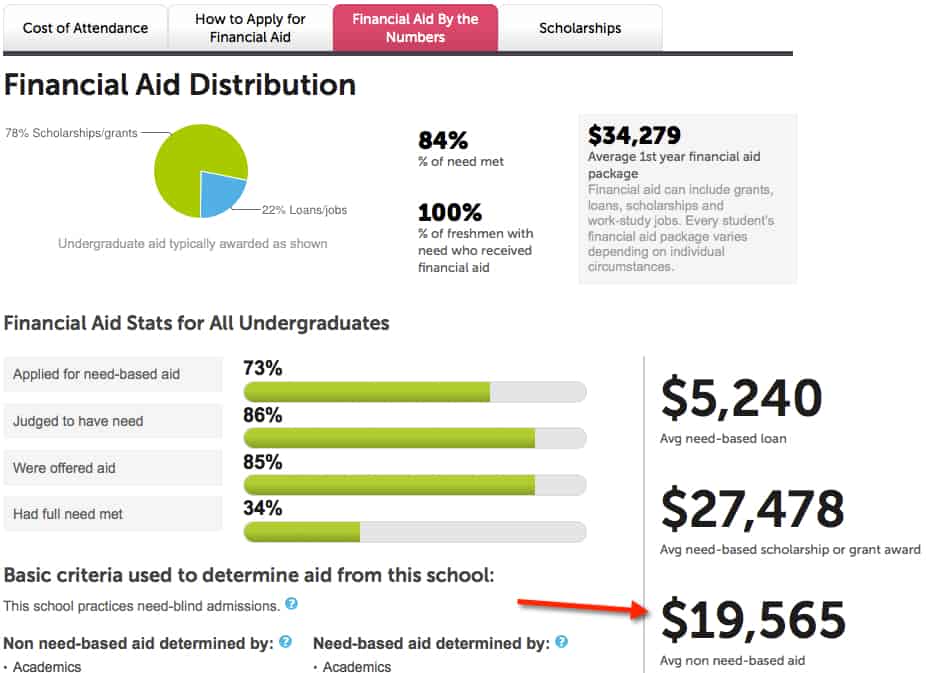
I’ve been getting questions about this lately from parents who are disappointed by some of the awards their children have been receiving.
One parent, for instance, told me that she was discouraged when her daughter received a $9,000 award from Whitman College in Walla, Walla, WA. It was a puny award compared to what some other schools offered including Willamette  University, a liberal arts college in Salem, OR, which gave the teenager a $20,000-a-year scholarship.
University, a liberal arts college in Salem, OR, which gave the teenager a $20,000-a-year scholarship.
I was not surprised that the smart teenager received less money from Whitman.
Schools higher on U.S. News & World Report’s college rankings, don’t have to offer large merit scholarships because affluent students, who tend to be the ones who pay attention to the rankings, are more likely to attend a highly ranked school without a merit scholarship.
College Rankings and Scholarships
In the 2014 college rankings, Whitman is ranked as the 41st best liberal arts college and is sandwiched between Union College (NY) and Connecticut College. In contrast, Willamette U., is ranked as the 61st best liberal arts college.
As I’ve written in my book and repeatedly on my blog, no one should assume that a higher ranking means a school is superior to those lower in the pecking order!!! For doubters, please read this fantastic New Yorker article on college rankings that Malcolm Gladwell wrote that slays this notion.
Appealing an Award
Students who are unhappy with their awards will sometimes be able to obtain a larger one. There are many factors at play including a school’s institutional practices.
For instance, it would be a complete waste of time to ask Williams or Amherst colleges for a merit scholarship for an admitted c hild since those schools don’t offer any. They are No. 1 and No. 2 liberal arts colleges, according to U.S. News, so they don’t have to bother with merit scholarships. Wealthy students pay full price at these schools and everyone else receives excellent need-based aid. This is the same practice observed by top institutions in the national university category including all the Ivies.
hild since those schools don’t offer any. They are No. 1 and No. 2 liberal arts colleges, according to U.S. News, so they don’t have to bother with merit scholarships. Wealthy students pay full price at these schools and everyone else receives excellent need-based aid. This is the same practice observed by top institutions in the national university category including all the Ivies.
Checking the Statistics
When looking up the merit aid practices of a school, I check its statistics on the website of the College Board or COLLEGEdata.
When I looked up Whitman’s stats on the College Board, I discovered that the typical merit award (referred to as non-need-based aid) was $8,427. This amount is slightly less than what the teenager received. Willamette’s average merit award is $17,749, which is less than what the teenager received.
Note: I have included a screenshot of Whitman’s updated financial stats and the average merit award has increased since I wrote this last year. It’s the same story for Willamette’s financial stats.
Whitman College’s Financial Stats
Willamette University’s Financial Stats
Checking Other Offers
Some schools will only reconsider an award if it’s a need-based request. Other schools, however, will review merit awards.
Typically schools will want to see award letters (need-based or merit-based) from schools that have given a student a better deal. A family will be in a much weaker position if a child hasn’t gotten higher awards from other schools.
Whether a student will have success appealing an award can also depend on whether a school’s admission office is nervous about meeting its freshman enrollment target. Some schools will eagerly give a student an additional award to ensure filling a freshman slot regardless of the merits of the appeal. In fact, in some cases, student’s don’t even need to ask.
Thomas Delahunt, vice president of admissions and student financial planning at Drake University, once told me at the annual conference of the National Association for College Admission Counseling that plenty of schools, which are behind in their freshmen deposits, will create additional scholarships in the spring to offer to accepted students to boost their acceptances. Schools can just slap random names on these pseudo awards.
Maureen McRae Goldberg, who is head of Occidental College’s financial aid office, said families appealing at her institution will have a chance of getting additional help if their appeal is based on costs beyond their control. For instance, a family might have high medical bills or they might be sending money back to grandparents in a foreign country who are impoverished.
 What won’t work at Occidental, Goldberg said, is asking for more money due to the household’s discretionary spending. Parents who complain about their mortgage on a multi-million-dollar house won’t get sympathy because it was their decision to buy an expensive residence.
What won’t work at Occidental, Goldberg said, is asking for more money due to the household’s discretionary spending. Parents who complain about their mortgage on a multi-million-dollar house won’t get sympathy because it was their decision to buy an expensive residence.
Goldberg recalled an appeal that the school initially decided to grant when the parnets explained that they had racked up $30,000 in medical bills. When the school obtained copies of the bills, however, the extra aid was denied.
Why? Because the medical bills were generated for the family pet!
My Next Parent Course…
I’ve been getting emails from people asking when I will be holding my next online course for parents on how they can cut the cost of college. I expect to start a class beginning May 19. Here is a description of my current parent course.
If you’d like to be notified when I know the course dates, please email me at Lynn@TheCollegeSolution.com.



Pingback: Understanding the Financial Aid Appeal Process | Road2College
Hi Lynn,
We are in the midst of evaluating merit awards from the schools where our son applied Early Action. He has been given some merit awards, but not at the highest level. We feel that if we approach the schools and have them re-evaluate him in a different context ( he attends school part-time the winter), they might reconsider him for the higher level scholarship. His credentials have him right on the line between the two levels. My question to you is should we do this now or wait until the spring? The schools that he is considering are all state flagships.
Hi Lynn,
What about appealing an award if it’s not the student’s Freshman year but Sophomore or Junior? You don’t have the same leverage to compare offers from other schools. Where do you find leverage? Thanks
Hi Warren,
You won’t have the leverage, but you can try. You could suggest that your child might have to find a less expensive school if the award doesn’t increase. You can mention why you can’t afford it and what you could pay. You would have much better luck if you applied for financial aid in those other years and actually qualified for need-based aid or were now eligible for more aid.
Lynn O’Shaughnessy
Lynn,
I am facing a dilemma. I have a student admitted to 3 colleges. She had turned in her FAFSA late, because she did not know her father’s financial condition had collapsed. It was submitted in early April. She is qualified for $5.750 in Pell Grants. She has two excellent private schools and UCLA working on her financial aid offers, BUT each university likely won’t be done processing and making an aid offer by the May 1 acceptance deadline.
This is an ethical question. She feels like she can only commit to one, regardless of whether the funds are there for her. UCLA’s office suggesta she accept the offer, and later withdraw if the financial aid doesn’t work.
What would you do in this case? Accept from two schools she prefers, and later(asap) withdraw, and lose the deposit? Have you had this situation occur before? The student is very sincere.
Thanks,
I’d double deposit!
Lynn O
I heard a very strange story from a parent last night. His child had been accepted at Cornell and University of Delaware. Cornell offered them a very significant amount of merit money. Delaware offered very little. The student wants to attend Delaware for their Kinesiology program. Dad wanted to know how to appeal the award at Delaware. I am curious as to the advice my colleagues would have given him.
Hi Charlotte,
Thanks for this question. The dad was confused when he said Cornell offered his son a substantial merit award. Cornell does not give merit awards – only need-based aid. So what he really got was a substantial need-based aid award. I don’t think you can use the Cornell financial aid package as leverage with Delaware. He would have gotten a much smaller financial aid package from Delaware because the school costs a lot less. Or maybe with Delaware his son did get a merit award. It’s unlikely that he would get a larger merit award from Delaware. What kids get is usually based on a formula linked to grades, test scores and class rank. There is no reason why he couldn’t appeal the award, but I’d be very surprised if he was successful unless there was something in his financial aid application that didn’t show up such as a recent job loss, high medical bills, a divorce/separation since the FAFSA was completed.
Lynn O.
Is is best for the student to send (sign) the appeal letter, or her parents? Same question for calling up the financial aid office, student or parent? Thank you.
Hi Irma,
I’d have the parents and the child sign a letter or email. I’d have the child contact the financial aid office to see who the school wants to hear from — the student or the parents. I personally think it’s more appropriate for parents since it’s their financial situation that’s most relevant, but schools can vary on this question.
Lynn O’Shaughnessy